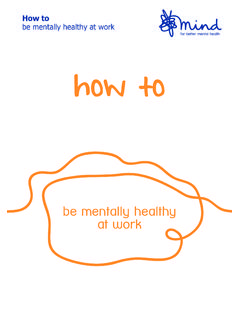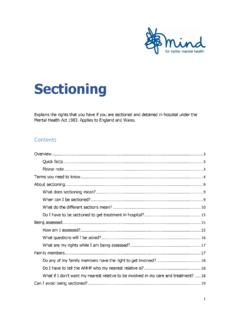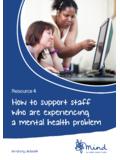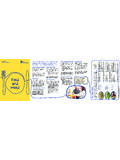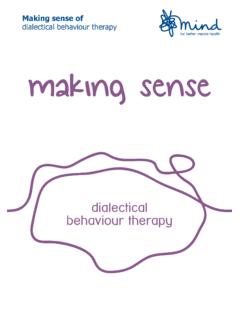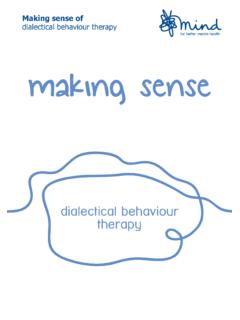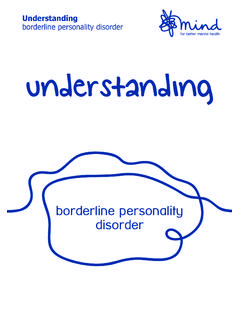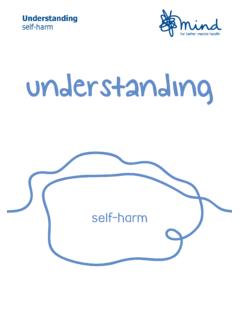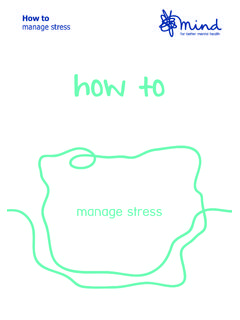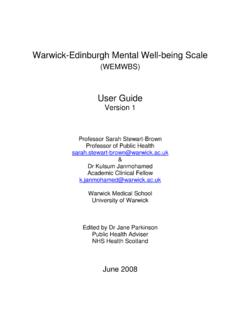Transcription of Understanding mental health problems understanding
1 Understandingmental health problems understandingmental health problems Understanding mental health problems mental health problems affect around one in four people in Britain. This booklet is for anyone who experiences a mental health problem , and your friends and family. It explains what mental health problems are, what may cause them, and the many different kinds of help, treatment and support that are are mental health problems ? 4 What kinds of mental health problems are there? 5 What causes mental health problems ? 12 How are mental health problems diagnosed? 13 How can I help myself? 15 What treatments are available? 19 What support services are available?
2 22 How do I ask for help? 25 Will I recover? 27 What can friends and family do to help? 28 Useful contacts 314 Understanding mental health problems What are mental health problems ? mental health problems can affect the way you think, feel and behave. They affect around one in four people in Britain, and range from common mental health problems , such as depression and anxiety, to more rare problems such as schizophrenia and bipolar disorder. A mental health problem can feel just as bad, or worse, as any other physical illness only you cannot see are a lot of different approaches to how mental health problems should be diagnosed, what causes them and which treatments are most effective.
3 And, unfortunately, there is still widespread stigma and discrimination towards people with mental health problems , and misunderstanding about what different diagnoses , despite these challenges, it is possible to recover from a mental health problem and live a productive and fulfilling perspectives on mental health problems Different cultures have different approaches to mental health and mental illness. Most Western countries agree on a similar set of clinical diagnoses and treatments for mental health problems . However, cultures in which there are other traditions or beliefs may not use these on the culture you grew up in, you might be more familiar with terms like 'poor emotional health ' or 'poor emotional wellbeing ' to describe your experiences, and have different ideas about how best to cope.
4 And in many cultures, mental health is closely associated with religious or spiritual life. How you understand your own mental health , and any problems you experience, will be personal to kinds of mental health problems are there?There are many different mental health problems , and many symptoms are common to more than one diagnosis. So you may experience the symptoms of more than one mental health problem at is a feeling of low mood that lasts for a long time and affects your everyday life. It can make you feel hopeless, despairing, guilty, worthless, unmotivated and exhausted. It can affect your self-esteem, sleep, appetite, sex drive and, sometimes, your physical health .
5 In its mildest form, depression doesn t stop you leading a normal life, but it makes everything harder to do and seem less worthwhile. At its most severe, depression can make you feel suicidal, and be are also some common specific forms of depression, such as: postnatal depression (PND) depression that can develop from between two weeks to up to two years after becoming a parent. It's usually diagnosed in mothers, but can affect partners too. seasonal affective disorder (SAD) depression that is related to day length and usually (but not always) occurs in the feels like I am locked in a black room inside myself.(See Mind's booklets Understanding depression, Understanding postnatal depression and Understanding seasonal affective disorder.)
6 AnxietyAnxiety refers to strong feelings of unease, worry and fear. Because occasional anxiety is a normal human experience, it's sometimes hard to know when it's becoming a mental health problem but if your feelings of anxiety are very strong, or last for a long time, they can be overwhelming. What kinds of mental health problems are there?6 Understanding mental health problems You might experience: constant worrying about things that are a regular part of everyday life, or about things that aren t likely to happen. unpleasant physical symptoms such as sleep problems , panic attacks, an increased heartbeat, an upset stomach, muscle tension or feeling shaky.
7 A specific anxiety disorder, such as generalised anxiety disorder (GAD), panic disorder, a phobia, obsessive-compulsive disorder (OCD) or post-traumatic stress disorder (PTSD).(See Mind's booklet Understanding anxiety and panic attacks and Understanding post-traumatic stress disorder.)Obsessive-compulsive disorder (OCD)OCD is a type of anxiety disorder. The term is often misused in daily conversation for example, you might hear people talk about being 'a bit OCD', if they like things to be neat and tidy. But the reality of this disorder is a lot more complex and has two main parts: obsessions intrusive thoughts, ideas or urges that repeatedly appear in your mind.
8 For example, thinking that you have been contaminated by dirt and germs, or worrying that you might hurt someone. compulsions repetitive activities that you feel you have to do. This could be something like repeatedly washing something to make sure it s clean or repeating a specific phrase in your head to prevent harm from coming to a loved aim of a compulsion is to relieve the intense anxiety caused by obsessive thoughts. However, the process of repeating these compulsions is often distressing in itself, and any relief you feel is often short-lived.(See Mind's booklet Understanding obsessive-compulsive disorder.)76 What kinds of mental health problems are there?
9 PhobiasA phobia is an extreme form of fear or anxiety triggered by a particular situation (such as going outside) or object (such as spiders), even when there is no danger. A fear becomes a phobia if it lasts for more than six months, and has a significant impact on how you live your day-to-day life. For example, you may begin to organise your life around avoiding the thing that you fear.(See Mind's booklet Understanding phobias.)Eating problemsEating problems aren t just about food. They can be about difficult things in your life and painful feelings, which you may be finding hard to express, face or resolve. Focusing on food can be a way of disguising these problems , even from yourself.
10 The most common eating problems are: anorexia not allowing yourself to eat enough food to get the energy and nutrition you need to stay physically healthy. Sometimes people assume that anorexia is about slimming and dieting, but it is often connected to very low self-esteem, negative self-image and feelings of intense distress. bulimia finding that you eat large amounts of food all in one go, often because you are feeling upset or worried (this is called bingeing); then feeling deeply guilty or ashamed, and taking steps to get rid of the food you have eaten (this is called purging). binge eating disorder feeling that you can t stop yourself from eating, even when you want to.
